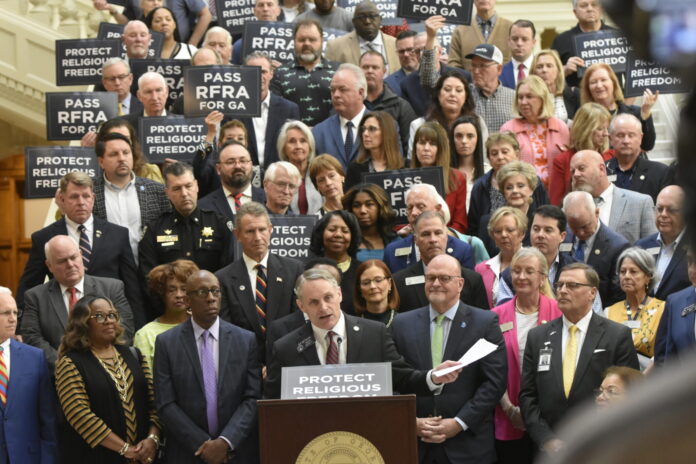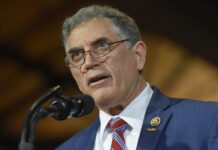
ATLANTA (Georgia Recorder) — On the penultimate day of the 2025 legislative session, some religious Georgians had their prayers answered.
A so-called religious freedom bill is on Gov. Brian Kemp’s desk after the House approved it 96-70 along mostly party lines late Wednesday night.
A Georgia Religious Freedom Restoration Act, or RFRA bill, has been a goal of the Georgia GOP since shortly after the U.S. Supreme Court legalized gay marriage in 2015.
Senate Bill 36 by Acworth Republican Sen. Ed Setzler places restrictions on state and local governments’ ability to “substantially burden a person’s exercise of religion” unless it is “in furtherance of a compelling governmental interest” and even then only if they use the “least restrictive means of furthering such compelling governmental interest.”
Cedartown Republican Rep. Trey Kelley said that means religious Georgians will have their rights protected from state and local governments the same way they are protected from the federal government under the First Amendment. A federal version passed in 1993.
“What this measure simply looks to do is codify the same balancing test for our exercise of religious freedom that the other four First Amendment rights have,” he said. “This should be something that we can agree to. We got a lot we can fight about. This should be something we can agree to.”

Democrats largely disagreed.
Opponents like Duluth Democratic Rep. Ruwa Romman say the bill would amount to a license to discriminate against those religious minorities and LGBTQ Georgians.
“I think a lot about what if a Muslim woman who wears a headscarf is in a workplace and her boss decides to fire her because it offends his faith?” said Romman, who is Muslim. “What if, for example, somebody is praying, takes five minutes to pray during the day, and their boss says, ‘you know what, you don’t believe in Jesus Christ as your Lord and Savior and I’m going to fire you. It is my business, I should be able to do that.’ And to some extent, there are already allowances for that to begin with. To me, the negatives far outweigh any potential benefits”
Democrats attempted to add an amendment to the effect that the law could not be used to discriminate but Republicans rejected it.
The state’s only currently-serving Jewish lawmaker, Sandy Springs Democratic Rep. Esther Panitch, said the law could allow discrimination against Jews if it came from a sincere religious belief.
Panitch said determining the motivation of antisemitic acts would mean more work for courts.

“Each case will require an extensive analysis of whether antisemitic expression is truly motivated by sincere religious beliefs,” she said. “The result is that secular antisemitism faces consequences while religiously motivated antisemitism receives protections.”
Both Romman and Panitch predicted RFRA could mean religious carveouts to the state’s abortion law. Panitch said Jews believe life begins at birth rather than at conception as state law says, and Romman said Islam prioritizes saving the life of a mother and the RFRA bill would make it impossible to live out that mandate.
Avondale Estates Democratic Rep. Karla Drenner, who became the Legislature’s first openly-LGBTQ member when she took office in 2001, read from the speech she read opposing a RFRA bill in 2016.
“I must note that the irony of debating the bill that licenses prejudice against my community in the city too busy to hate is not lost on me,” she said. “I oppose – back then it was House Bill 757, today it’s Senate Bill 36 – I oppose it for any number of reasons. It says that my rights under the constitution, under the law and under God are not inalienable but rather are subject to the opinions of others.”
In a surprise move, Republican Gov. Nathan Deal vetoed that year’s RFRA bill.
Drenner also took a swipe at a slate of red meat bills she suggested were signs of weakness in the GOP.
“This year, we have let the other chamber that’s running for governor run our chamber over here, from my perspective,” she said. “We’ve done all these terrible bills, from my perspective.”

Republican representatives took the opposite view.
“I got a little frustrated over there when I was listening, this is dealing with government burdening the free exercise of religion in this state,” said Bremen Republican Rep. Tyler Paul Smith. “This is not a license for a private citizen to use this against another private citizen.”
Dawsonville Republican Rep. Will Wade said the measure will reaffirm Georgians’ bedrock religious freedoms.
“Senate Bill 36 simply gives people of all faiths, all faiths, their day in court if they believe the government has overreached,” he said. “Over half of the states – we’ve heard it today, 39 now, we can be the 40th – It is time that Georgia provide the same safeguards that 39 other states in our country have for their citizens. We are a state very rich in diversity, I think that’s what makes it better.”
Kemp has 40 days from Friday to sign, and has indicated he will do so.
“I want to congratulate those who worked for the passage of SB 36,” he said in a statement. “I have always maintained that I would support and sign a version of RFRA which mirrors the language and protections provided by federal law since 1993. My commitment to that promise and to the deeply held beliefs of Georgians of faith remains unwavering. I also want to assure those of differing views that Georgia remains a welcoming place to live, work, and raise a family.“







